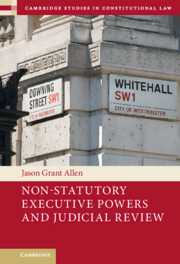
-
Select format
-
- Publisher:
- Cambridge University Press
- Publication date:
- August 2022
- August 2022
- ISBN:
- 9781009039321
- 9781316510667
- 9781009017725
- Dimensions:
- (229 x 152 mm)
- Weight & Pages:
- 0.65kg, 354 Pages
- Dimensions:
- (229 x 152 mm)
- Weight & Pages:
- 0.25kg, 354 Pages
- Subjects:
- Constitutional and Administrative Law, Law, Jurisprudence
- Series:
- Cambridge Studies in Constitutional Law (36)
You may already have access via personal or institutional login- Subjects:
- Constitutional and Administrative Law, Law, Jurisprudence
- Series:
- Cambridge Studies in Constitutional Law (36)
Book description
That non-statutory executive powers are subject to judicial review is beyond doubt. But current judicial practice challenges prevailing theories of judicial review and raises a host of questions about the nature of official power and action. This is particularly the case for official powers not associated with the Royal Prerogative, which have been argued to comprise a “third source” of governmental authority. Looking at non-statutory powers directly, rather than incidentally, stirs up the intense but ultimately inconclusive debate about the conceptual basis of judicial review in English law. This provocative book argues that modern judges and scholars have neglected the very concepts necessary to understand the supervisory jurisdiction and that the law has become more complex than it needs to be. If we start from the concept of office and official action, rather than grand ideas about parliamentary sovereignty and the courts, the central questions answer themselves.
Contents
Metrics
Altmetric attention score
Full text views
Full text views help Loading metrics...
Loading metrics...
* Views captured on Cambridge Core between #date#. This data will be updated every 24 hours.
Usage data cannot currently be displayed.
Accessibility standard: Unknown
Why this information is here
This section outlines the accessibility features of this content - including support for screen readers, full keyboard navigation and high-contrast display options. This may not be relevant for you.
Accessibility Information
Accessibility compliance for the PDF of this book is currently unknown and may be updated in the future.

